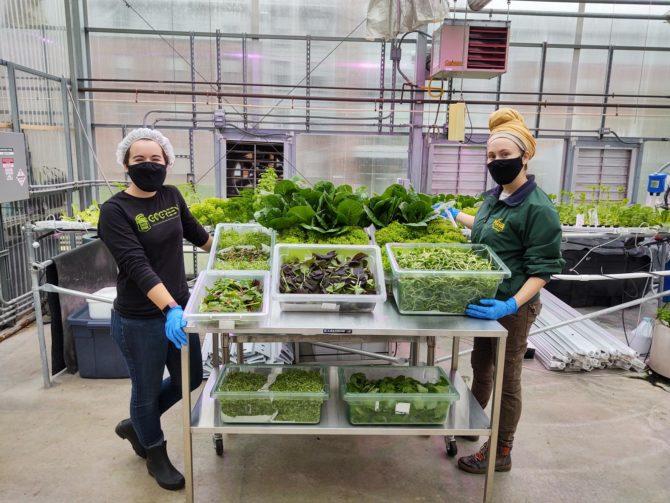When the COVID-19 pandemic broke out in March 2020, the order came down to get rid of all the plants in the Presidents Park Hydroponic Greenhouse on George Mason University’s Fairfax Campus.
It was out of an abundance of caution, said Doni Nolan, the Greenhouse and Gardens program manager.
“We didn’t know what the risks were,” she said. “We were so terrified that if we tried to donate the greens, they might have COVID.”
Eleven months later, the vibe is completely different.
The Greenhouse and Gardens Program—which runs the Presidents Park Hydroponic Greenhouse, the Innovation Food Forest and the Potomac Heights Organic Vegetable Garden—is building off a successful fall semester that provided students with a hands-on learning experience, thanks to the diligent efforts of Nolan’s staff in creating safe spaces to work.
Nolan said the program, which had no known COVID-19 transmissions, saw about 100 volunteers—primarily students—complete about 500 shifts and put in about 1,000 hours of service during the fall 2020 semester.
She said 16 students have signed on as interns for the Spring 2021 semester, a record for the program.
“Students are still required to do hours, and they want to do hours in person,” Nolan said. “And they feel safe doing it with us.”
For Nolan; Hala Elbarmil, who coordinates the Innovation Food Forest; Alexa Hines, who coordinates the Potomac Heights Vegetable Garden; and Lynn Ruffa, who coordinates the Presidents Park Hydroponic Greenhouse, the must-do list to make their areas safe was extensive.
At the greenhouse, which already had a ventilation system, other equipment was removed to create space for social distancing. Doorknobs and faucets are sanitized, hand sanitizer is available, masks are required, and students are asked to sanitize their phones.
In the gardens, gloves are given to the students in a plastic bag. The gloves are theirs for the semester, no sharing. Tools are sanitized as are the pens on the sign-in clipboard.
A maximum of 10 people, including two staffers, are allowed in the greenhouse at one time, Nolan said, and up to 15 people, including staff, can be in the gardens.
The Presidents Park Hydroponic Greenhouse gives students a rare opportunity to participate in a sustainable farm-to-table operation as the fresh greens—basil, cilantro, lettuce and microgreens—and tomatoes are grown there and sold to Mason Dining. The money helps sustain the greenhouse.
The Innovation Food Forest teaches students about sustainable agricultural design, outdoor composting, and the importance of preserving natural, outdoor green spaces. Plus, whenever volunteers are hungry, they can forage for strawberries, paw-paws, and medicinal herbs, all of which grow naturally.
The Potomac Heights Organic Vegetable Garden is co-managed by the GMU Organic Gardening Association (GOGA). Students at this site learn about outdoor composting, maintaining garden beds and harvesting produce such as peaches, kiwi fruit and figs.
Make an impact at Mason today. Join hundreds of on-site and virtual volunteers by creating a free account on the Office of Sustainability’s Sustainable Sign Ups portal. Please remember masks and social distancing are required. Additionally, Mason students can participate in the Greenhouse and Gardens Academic Internship Program to earn course credit while gaining hands-on skills.

